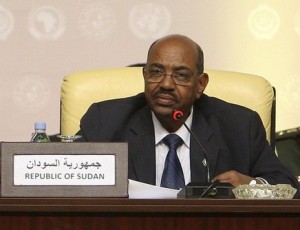Sudan leader slams UN “hidden agenda” over Darfur
Sept 14, 2006 (BANJUL) — Sudanese President Omar Hassan al-Bashir on Thursday reaffirmed his refusal to accept United Nations peacekeeping troops for Darfur, saying they had a hidden agenda to “recolonise” his country.
 Bashir, speaking at the end of a brief visit to Gambia, said the existing 7,000-strong African Union (AU) peacekeeping force in the conflict-torn western Sudanese region had been successful and should continue its mission there.
Bashir, speaking at the end of a brief visit to Gambia, said the existing 7,000-strong African Union (AU) peacekeeping force in the conflict-torn western Sudanese region had been successful and should continue its mission there.
The AU mission expires on Sept. 30 and the U.N. Security Council last month passed a resolution to deploy more than 20,000 U.N. peacekeeping troops in Darfur. The Sudanese government has rejected the resolution.
“The U.N. forces have a hidden agenda in Sudan because they are not coming for peace in Darfur. They want to recolonise Sudan,” Bashir told a news conference. He spoke in Arabic through an interpreter.
“Sudan was the first African country south of the Sahara to get independence. We are not ready to be the first to be recolonised,” he added.
Bashir rejected arguments that the AU did not have enough resources to extend its mission in Darfur, where tens of thousands of people have been killed and more than 2 million displaced by political and ethnic conflict since 2003.
“The AU experience is a very successful one, a positive, a constructive one. The AU troops should continue their mission in Darfur,” Bashir said.
Experts say violence in Darfur has escalated since an AU-brokered peace deal was signed with one rebel faction in May.
Western leaders and relief agencies have warned of a humanitarian catastrophe unless a strong U.N. force is allowed in to secure the region and protect civilians from attacks by government troops, rebels and militias.
European Union’s special envoy Pekka Haavisto said on Tuesday after a three-day visit to the region that Sudanese government forces were bombing civilians in Darfur in an operation reminiscent of the early stages of the conflict.
(Reuters)
